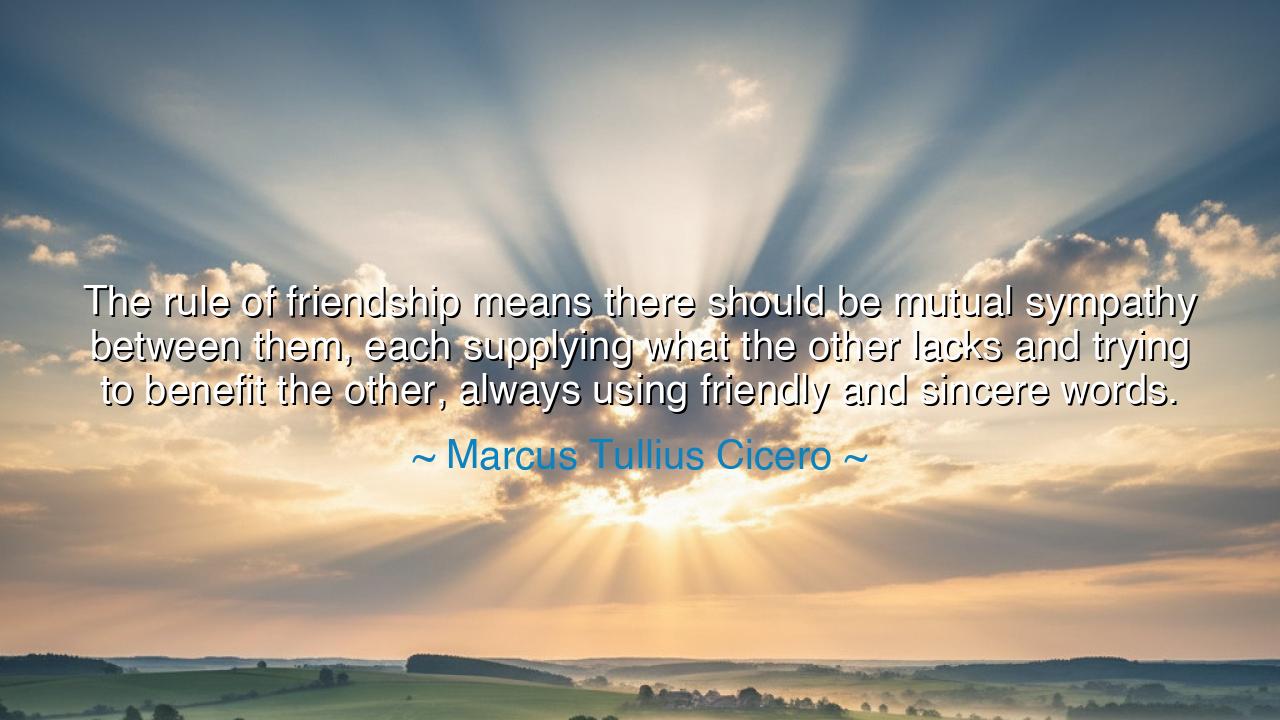
The rule of friendship means there should be mutual sympathy
The rule of friendship means there should be mutual sympathy between them, each supplying what the other lacks and trying to benefit the other, always using friendly and sincere words.






In the wise and enduring words of Marcus Tullius Cicero, the Roman orator and philosopher who sought to guide humanity toward virtue, we find a truth that glows with eternal light: “The rule of friendship means there should be mutual sympathy between them, each supplying what the other lacks and trying to benefit the other, always using friendly and sincere words.” These words, spoken more than two thousand years ago, still echo across the ages, for they speak of the sacred art of friendship — that divine bond which unites hearts not by blood, but by shared purpose, compassion, and understanding. Cicero, who lived amid the tumults of politics and betrayal, knew well that true friendship is not born of convenience or flattery, but of mutual respect, of giving and receiving with sincerity and grace.
The origin of this wisdom lies in Cicero’s treatise Laelius de Amicitia — On Friendship — a dialogue written after the death of his beloved friend Scipio Africanus. In that work, Cicero sought to immortalize his friend’s virtues and to define what it truly means to call another “friend.” To Cicero, friendship was not a luxury, but one of life’s greatest necessities — “without which,” he wrote, “no house, no city, no nation can stand.” Yet he also knew that friendship, like all noble things, must be governed by principle. The rule of friendship, he declared, is not simply affection, but sympathy, where one heart feels the joy and pain of the other; mutual support, where each strengthens what the other lacks; and sincerity, where words are spoken with honesty and kindness. In this rule, Cicero gives us not a fleeting sentiment, but a code of conduct for the soul.
To say there must be mutual sympathy is to say that true friendship is not one-sided. It cannot live where selfishness reigns. It is not domination nor submission, but equality of spirit — each understanding the other’s strengths and weaknesses, and each striving to uplift, not to use. The wise friend, Cicero tells us, sees the other’s need as his own, and supplies it without hesitation. Such love requires humility: the willingness to recognize that one is not complete alone. Just as two hands join to perform a single task, so two friends together form a more perfect whole. “Each supplying what the other lacks” — this is the heart of friendship, the holy exchange through which both souls grow richer.
Consider the bond between David and Jonathan in the ancient scriptures, one of the purest friendships ever recorded. Jonathan, the son of a king, loved David, the shepherd-warrior destined to rule. Though David’s rise threatened Jonathan’s inheritance, Jonathan did not act with envy but with generosity; he gave David his armor, his sword, even his loyalty against his own father. And David, in return, honored Jonathan’s family long after his death. Each gave to the other what the other lacked — courage for guidance, loyalty for humility, affection for strength. Their friendship, tested by power and war, embodied the rule Cicero describes: mutual sympathy, selfless benefit, and the sincere words of love that bind souls more tightly than any crown or command.
But Cicero’s teaching also carries a warning — that friendship cannot survive where deceit dwells. “Always using friendly and sincere words,” he says, for sincerity is the lifeblood of companionship. To flatter a friend falsely is to poison trust; to hide truth for comfort is to let ignorance destroy the bond. The wise friend speaks truth, but with compassion — not to wound, but to heal. The words of a true friend may sting, yet they are like the surgeon’s knife: they cut only to cure. False praise, though sweet, corrupts the soul like honey hiding venom. Thus, Cicero teaches that friendship must be nourished by honesty, for without truth, even love withers into pretense.
This ancient wisdom finds echoes even in the modern world. Think of the friendship between Helen Keller and Anne Sullivan — one blind, one sighted; one silent, one speaking. Each supplied what the other lacked. Anne gave Helen the gift of language and light; Helen gave Anne the gift of purpose and immortal gratitude. Their bond was not born of equality in ability, but of equality in spirit. Together, they proved that mutual sympathy and selfless service can conquer even the cruelest barriers of nature. Such friendships, rare though they are, show that Cicero’s words are not bound to the past; they are eternal laws of the human heart.
And so, my child, learn from Cicero’s rule of friendship and make it your own. Do not seek friends who flatter your vanity, but those who strengthen your virtue. Do not measure friendship by pleasure alone, but by how it refines your soul. Be to your friend what they need most — a mirror for truth, a shelter in sorrow, a champion in hardship. Speak sincerely, act selflessly, and forgive quickly. Remember always that friendship is a living flame: it must be fed by care and honesty, or it will fade into ashes.
For in the end, Marcus Tullius Cicero’s wisdom stands unshaken by time: friendship is not an accident of life, but a sacred partnership of souls. When two hearts meet in sympathy, when each gives freely to the other, and when words are always friendly and sincere, then the bond becomes unbreakable — not even death can destroy it. Cherish such friendship, cultivate it with honor, and you will possess not merely a companion, but a reflection of the divine within yourself.






AAdministratorAdministrator
Welcome, honored guests. Please leave a comment, we will respond soon